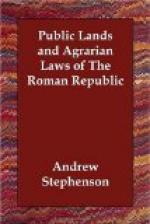A great part of the wealth of the Romans consisted in domains of this kind, and the question will occur to the thoughtful mind how the government was able to keep the most distinguished part of her citizens in a legal position so uncertain and alarming. English law is very different from the Roman in this respect and would decide in favor of the tenant and against the state. It is fairly possible that this uncertainty of tenure tended to render the government more stable and less liable to sudden revolutionary movements, thus having the same effect upon the Roman government which funded debts have upon the nations of to-day.
[Footnote 1: Long, Decline of the Roman Rep., I, ch. 11.]
[Footnote 2: Muirhead, Roman Law, 92.]
[Footnote 3: Ortolan, Histoire de la legislation Romaine, p. 21.]
[Footnote 4: Mommsen, I, 131; Arnold, I, 157.]
[Footnote 5: Dionysius, IV, 11, Livy.]
[Footnote 6: Ihne, I, 175.]
[Footnote 7: Ihne, I, 175.]
[Footnote 8: Livy, Bk. I, c. 38, with note by Drachenborch; Livy, Bk. VII, c. 31.]
[Footnote 9: Siculus Flaccus, De Conditione Agrorum, 2, 3: “Ut vero Romani omnium gentium potiti sunt, agros alios ex hoste captos in victorem populum partiti sunt, alios verro agros vendiderunt, ut Sabinorum ager qui dicitur quaestorius.”]
[Footnote 10: Cicero, in Verrem, II, Bk. 3, Sec. 6.]
[Footnote 11: Giraud, Droit de propriete chez les romains, 160.]
[Footnote 12: Ihne, I, 175.]
[Footnote 13: Muirhead, 92; Giraud, 165.]
[Footnote 14: Higin., De Limit. Const. apud Goes. Rei Agr. Script., pp. 159-160.]
[Footnote 15: Giraud, 164.]
[Footnote 16: Dionysius, II, 7.]
[Footnote 17: Aristotle, Polit., [Greek: Z. Keph. th. 7: Anagkaion toinun eis duo merae diaeraesthai taen choran kai ton men einai koinaen, taen de ton idioton.]]




